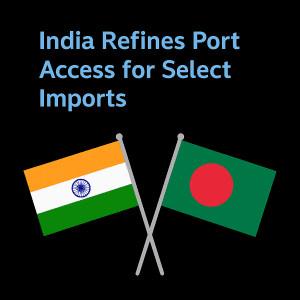New Delhi, 17 May 2025 – In a significant move reflecting India’s strategic trade management and regulatory priorities, the Directorate General of Foreign Trade (DGFT), under the Ministry of Commerce and Industry, has issued a notification imposing specific port restrictions on the import of selected goods from Bangladesh. These goods include categories such as ready-made garments, processed food items, cotton waste, and select plastic products.
The decision, announced through Notification No. 07/2025-26 dated 17th May 2025, is aimed at ensuring controlled inflow, enhancing quality compliance, and safeguarding domestic industries in sensitive border regions. While the move introduces limitations at various land ports and integrated check posts, it still facilitates continued trade via major seaports such as Nhava Sheva and Kolkata, reflecting a calibrated approach to bilateral trade oversight. The policy maintains clarity by explicitly excluding goods like fish, LPG, edible oils, and crushed stone—items vital for consumption and infrastructure—from these restrictions.
🔹 Key Restrictions Imposed
The latest directive focuses on restricting land-based imports of several finished goods from Bangladesh, while streamlining entry through designated seaports. The move is aimed at optimizing customs control, improving port infrastructure usage, and possibly addressing security and quality concerns. The main highlights of the notification include:
✅ Permitted Entry Ports for Ready-Made Garments
-
Restriction: Import of all kinds of readymade garments from Bangladesh will not be permitted through land ports.
-
Permitted Ports: Only Nhava Sheva (Jawaharlal Nehru Port) in Maharashtra and Kolkata Seaport in West Bengal are allowed for such imports.
✅ Goods Not Allowed Through Specific Land Customs Stations (LCS)
The following goods from Bangladesh are restricted from being imported via LCSs/ICPs in certain Northeast and East Indian regions:
Goods affected:
-
Fruit and fruit-flavoured drinks
-
Carbonated beverages
-
Processed food items
-
Cotton and cotton yarn waste
-
Finished plastic and PVC goods (excluding inputs like pigments, dyes, plasticisers, and granules for domestic manufacturing)
-
Wooden furniture
Restricted Ports/LCSs:
-
LCSs and ICPs in Assam, Meghalaya, Tripura, Mizoram
-
LCS Changrabandha and Fulbari in West Bengal
These items must be routed through alternate customs points or designated seaports if imported from Bangladesh.
✅ Exceptions – Unrestricted Goods
Certain essential goods remain exempt from these restrictions, ensuring continued flow of crucial commodities, especially to landlocked regions:
-
Fish
-
Liquefied Petroleum Gas (LPG)
-
Edible oils
-
Crushed stone
These can continue to be imported via existing land ports without any new restriction.
🔸 Goods Transiting to Nepal and Bhutan Exempted
The DGFT clarified that the new restrictions will not apply to goods from Bangladesh that are transiting through Indian territory to Nepal or Bhutan. This provision reinforces India’s commitment to regional connectivity and its transit trade obligations under various bilateral and regional agreements.
📌 Policy Implications and Strategic Outlook
This notification indicates a calibrated trade policy approach aimed at:
-
Streamlining imports of sensitive and high-volume goods
-
Promoting quality control through enhanced port infrastructure
-
Potentially encouraging domestic production and formal sector import channels
The port restriction also reflects broader concerns regarding informal trade and overland entry points, particularly in the context of sensitive border areas and evolving regional trade dynamics.
Conclusion of Port Restrictions
 The DGFT’s latest notification serves as a targeted regulatory intervention to balance open trade with strategic safeguards. By imposing port-specific limitations on a curated list of goods, the Indian government is addressing concerns related to quality standards, port capacity, and domestic manufacturing protection, particularly in Northeast India.
The DGFT’s latest notification serves as a targeted regulatory intervention to balance open trade with strategic safeguards. By imposing port-specific limitations on a curated list of goods, the Indian government is addressing concerns related to quality standards, port capacity, and domestic manufacturing protection, particularly in Northeast India.
At the same time, by continuing to allow key commodities through designated entry points and exempting essential goods, the directive ensures that bilateral trade and regional cooperation are not adversely disrupted. The policy reflects India’s broader commitment to transparent, rule-based trade that aligns with national economic priorities while continuing to foster good-neighborly ties with Bangladesh.
The detailed notification is available on the DGFT website.
For more real time updates, visit Channel 6 Network.

